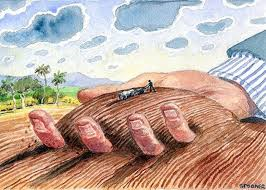As cultivable land at home is lost to urbanization, industry and infrastructure projects, Indian companies are acquiring land in Asia and Africa for farming.
So far, Indian companies have acquired nearly 1.3 million hectares of land in a dozen countries: Ethiopia, Cambodia, Indonesia, Madagascar, Kenya, Liberia, Tanzania, Sudan, Malaysia, Mozambique, Uganda and Zambia.
Land Matrix, a global land monitoring initiative that tracks land dealings worldwide, has placed India among the top 10 countries that have acquired large tracts of land abroad, primarily for agriculture, in Africa and Asia. The country ranks eighth, next to China, in the list which includes USA, Malaysia, United Arab Emirates (UAE) and the UK among the top buyers.
Of the total 848 deals concluded globally since 2008, 80 involve Indian companies that have invested in 65 deals to grow foodgrains, sugarcane, oil seeds, tea and flowers.
Land Matrix data show 1,289,000 hectares have been acquired via long term lease or ownership basis in 39 deals by Indian companies. The US tops the list with 7,147,000 hectares, followed by Malaysia (3,458,000 hectares) and the UAE (2,833,000 hectares).
These acquisitions have been driven by the 2007-08 increase in world food prices, scarcity of land in India, global rise in demand for basic staples such as pulses and food grains and diet diversification to high value commodities like fruits, vegetables, processed meat and milk.
Over the last two decades, the net sowing land in India has reduced from 42 million hectares to 40 million hectares. We lost agriculture land to real estate and industry and there is no scope to increase net sowing land, the Hindustan Times today quoted Professor Vijay Paul Sharma, centre for management in agriculture at the Indian Institute of Management (IIM), Ahmedabad, as saying.
Sharma, a former agriculture economist with the Indian Council for Agriculture Research (ICAR), added: With farming moving to production of more high value crops, limited availability of land in the country and slow pace of technology in agriculture, the alternative available to large companies who want to produce more is to acquire land overseas.
Sannati Group of Companies is one such group. It acquired on lease in October 2010 fertile land with virgin soil and access to unlimited water for irrigation in Ethiopia, one the company said had never been cultivated for a long time.
It is impossible to get 10,000 hectares of land in a single tract in India. Land acquisition in India by private parties is not only a socio-economic issue but also a politico-economic issue. The cost of acquisition also will be too much, Sannati Group managing director Pradeep Mannemela said.
Food analysts said the produce is not shipped back into the country and refer to this phenomenon as grabbing land and water resources by companies in poverty-stricken African countries.
An international peer reviewed study titled ‘Global Land and Water Grabbing’ earlier this year published in the US-based Proceedings of the National Academy of Sciences claimed that about 60% of the total grabbed water is appropriated, through land grabbing, by companies in the US, UAE, India, United Kingdom, Egypt, China and Israel.
Foreign countries are acquiring land in India too. The US, UK, Austria and Thailand have concluded 36 deals in India in states such as Gujarat, West Bengal, Orissa and Andhra Pradesh. Data available with Land Matrix for seven deals indicates that 13,105 hectares of land has been acquired in this way.
Land grabbing is a new form of colonialism that has intensified in the last four years. A few major environmental and societal issues are emerging as a result of land and water grabbing. Some of the countries affected by land grabbing exhibit relatively high levels of malnourishment, said the paper. The cost of grabbing land overseas may be lower than acquiring land in the home country.
The study showed that foreign land acquisition involves 62 countries that gave away land and 41 that acquired it. Africa and Asia account for 47% and 33% of the globally grabbed area respectively with about 90% of the land located in 24 countries.
Every second, an area the size of a football field (0.72ha) is acquired, said Devinder Sharma, food and trade policy analyst. I call these corporations food pirates.
He charged that the Indian government is promoting this policy. There is nothing more disastrous. Intensive farming will destroy food and water security of those countries. Food piracy will be a crisis in days to come, he warned.
With social and political tensions in many African countries over acquisitions, the initial rush to acquire land has tapered, said experts.
In the early years, the US and China jumped in to acquire land while Indian got in later. But corporate will now need to consider local and political factors which is becoming a major hurdle in those countries, said Sharma.














